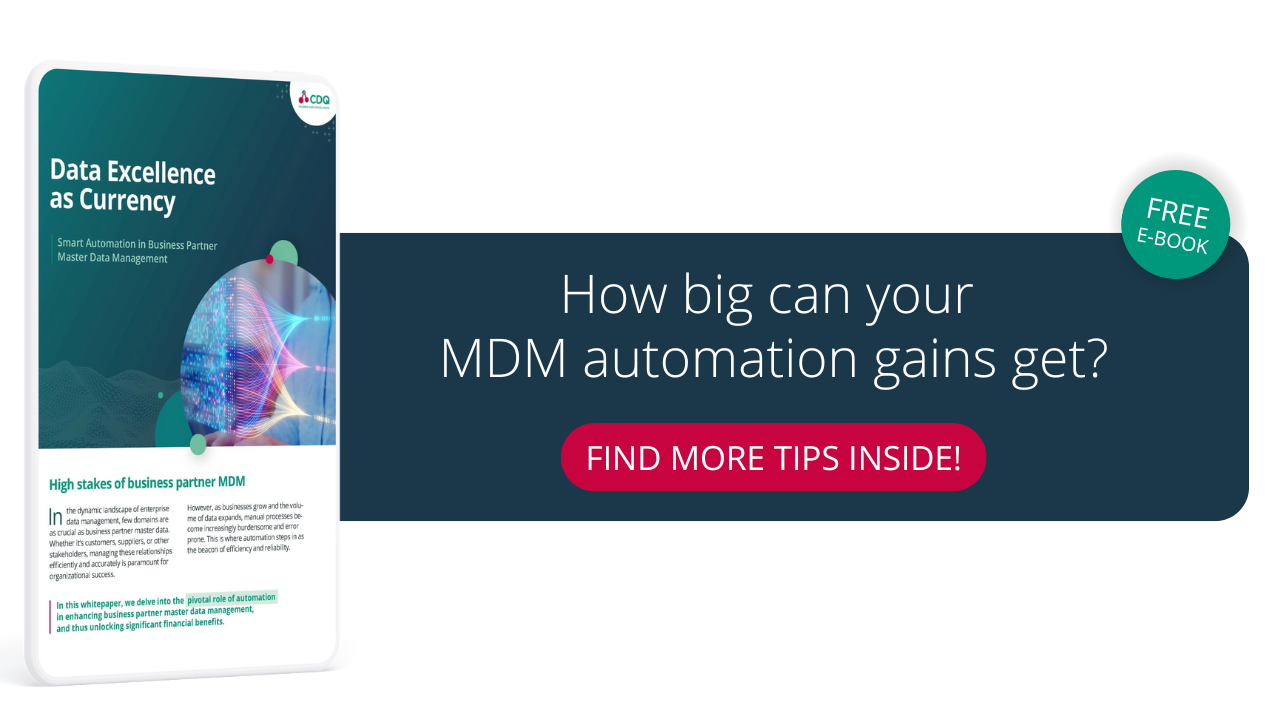MDM automation: business partner data management booster

In today’s fast-paced business environment, managing master data efficiently is more critical than ever. Master Data Management (MDM) forms the backbone of organizational operations, ensuring that information flows seamlessly across departments and systems.
Within MDM, the business partner domain, comprising customer, supplier, and partner data, serves as a cornerstone, consolidating data from various sources into a unified view. This data streamlines processes, supports decision-making, and drives strategic planning, ensuring smooth operations across all business functions.
Traditionally, managing business partner master data has been a manual and labor-intensive process involving the creation, validation, maintenance, and governance of data. Manual data handling presents numerous challenges: it's time-consuming, prone to errors, and difficult to scale, especially as organizations grow and data volumes increase. Disparate systems and data sources often lead to inconsistencies and inaccuracies, compromising the integrity of critical information.
However, many organizations still rely on manual processes to manage this data, leading to several challenges:
- Data silos: Business partner data often resides in disparate systems, making it difficult to achieve a unified view.
- Inconsistencies and errors: Manual data entry and updates increase the likelihood of errors, leading to inaccurate or outdated records.
- Slow processing times: Manual workflows can delay the onboarding of new partners or the updating of existing records, affecting business agility.
- Compliance risks: Inaccurate or incomplete data can result in non-compliance with regulatory requirements, potentially leading to fines or reputational damage.
The promise of automation
Automation offers a powerful solution to these challenges by streamlining and standardizing the management of business partner master data. Automation accelerates data entry and validation, enforces compliance, and reduces errors, unlocking substantial financial benefits and paving the way for sustainable growth and competitive advantage.
Key use cases
Let’s delve into four pivotal use cases where automation delivers remarkable value:
- business partner creation
- VAT ID verification
- bank account validation
- and managing incoming data changes.
Streamlined business partner creation: laying the foundation for success
The challenge:
Creating business partner records is a crucial yet time-consuming process. It involves gathering and verifying data from multiple sources, ensuring accuracy, and obtaining approvals. This manual process is not only slow but also prone to errors, leading to inefficiencies, increased costs, and damaged business relationships.
The advantage:
Automating the business partner creation process can reduce the time required for data entry from 15 minutes to just 1 minute, translating to potential savings of €187,000 annually for 10,000 new records. Automation ensures correct and complete data entry from the start, laying a solid foundation for long-term business relationships.
Real-life example:
>>Learn more about Tetra Pak automation journey
Business gains:
- Shorter sales cycles: faster onboarding of customers and suppliers leads to quicker revenue realization.
- Lower transaction costs: reduced manual effort lowers the overall cost of processing business partner data.
- Better supplier relationship management: accurate data from the start enhances interactions with suppliers, improving negotiation outcomes and collaboration.
VAT ID verification: ensuring seamless tax compliance
The challenge:
VAT ID verification is critical for maintaining tax compliance, especially in international transactions. However, manual verification processes—such as contacting suppliers or searching through government databases—are time-consuming and prone to errors, leading to potential compliance issues and financial penalties.
The advantage:
Automating VAT ID verification reduces the verification time from 12 minutes to 1 minute per record, potentially saving up to €147,000 annually for verifying 10,000 records. Automation ensures that VAT IDs are correctly linked to company names and addresses, facilitating smooth audits and compliance with tax regulations.
Real-life example:
>>Learn more about Schwarz IT automation journey
Business gains:
- Smooth audits: automated verification ensures that financial records are accurate, reducing the risk of audit complications.
- Correct application of zero VAT rate: ensuring correct VAT IDs supports compliance with tax laws, particularly for intra-community supplies.
- Increased user satisfaction: internal users benefit from faster, more reliable processes, enhancing overall productivity.
Bank account validation: building trust and mitigating fraud risks
The challenge:
Bank account validation is essential for preventing payment fraud, but traditional methods are often slow and involve extensive manual checks. This process not only delays transactions but also increases the risk of errors and fraudulent activities.
The advantage:
Automating bank account validation reduces the time required from 13 minutes to just 1 minute per record, resulting in potential savings of €157,000 annually for verifying 10,000 records. Automation helps ensure that invoices are issued with correct billing information, streamlining billing and payment processes while lowering operational and financial risks.
Real-life example:
>>Learn more about Covestro automation journey
Business gains:
- Correct billing information: automated validation ensures that invoices are accurate, reducing the likelihood of disputes and payment delays.
- Streamlined payment processes: faster validation leads to quicker processing of payments, improving cash flow.
- Lowered risks: by preventing fraudulent transactions, automation safeguards company assets and reduces financial risk.
Business partner data changes: ensuring accuracy and efficiency
The challenge:
Business partner data is constantly evolving, with frequent changes in addresses, legal statuses, and management structures. Manually tracking and updating these changes is labor-intensive and increases the risk of working with outdated or inaccurate data, leading to costly errors and operational inefficiencies.
The advantage:
Automation in managing data changes ensures that updates are identified and processed in real-time. This approach reduces manual effort by 88%, ensuring that data remains accurate and up-to-date while enabling faster and more efficient operations.
Real-life example:
>>Learn more about Bayer automation journey
Business gains:
- Proactive data management: automation helps organizations stay ahead of data changes, reducing the risk of errors and improving decision-making.
- Reduced workload: by automating routine updates, employees can focus on more strategic tasks, driving greater efficiency.
- Lower costs: automation reduces the costs associated with manual data updates, freeing up resources for other business initiatives.
These real-world implementations have unlocked savings in the five to seven-digit range, proving the untapped potential ready for organizations to harness.
By automating data creation, validation, and updates, organizations can unlock significant savings in cost, time, and resources, enhancing efficiency, improving data quality, and supporting compliance, which ultimately leads to better decision-making and operational excellence.
Here’s how you can create a trustworthy foundation for the entire organization by using CDQ to automate both the creation and maintenance of master data:
Easy compliance checks: CDQ simplifies the onboarding process by screening potential business partners against sanctions lists before they even enter your system. This helps you quickly identify and avoid any problematic suppliers.
Accurate data from the start: When you enter a supplier’s name and location, CDQ provides a complete and accurate data record right away. This eliminates the need for manual searches and validation of details like tax numbers, making data entry more efficient.
Simplified bank details validation: CDQ makes it easy to verify bank details by cross-referencing with other companies. This reduces extra research efforts and helps ensure that your financial data is correct.
Automated approval workflow: For suppliers with lower turnover expectations, CDQ can automate the approval process, reducing manual work. For more critical suppliers, you can still apply manual approval for additional scrutiny.
Ongoing data quality: CDQ regularly performs quality checks to ensure your master data stays accurate. This proactive approach helps prevent errors and ensures your data remains up-to-date, providing a trustworthy source of information about your organization’s customers, vendors, and suppliers.
To see more about how automation can enhance business partner master data management throughout its entire lifecycle, explore our white paper. It provides additional examples and real-world data showing the transformative benefits of automation in managing master data.
Embracing automation enables organizations to stay ahead of data challenges, reduce manual effort, and achieve a higher degree of accuracy and efficiency. As businesses continue to evolve, automation will be a key enabler of sustainable growth and competitive advantage in the realm of master data management.
Curious to learn more? Get in touch with us or dive deeper with our white paper.

Get our e-mail!
Related blogs
Master Data Management meets AI: work smarter, not harder
Let's be honest, master data management (MDM) often feels like a Sisyphean task. Wrangling inconsistent data, battling data decay, and striving for a single…
How AI and MDM work together to drive business success
In today's fast-paced world, Artificial Intelligence (AI) is becoming a must-have for making smart decisions, automating tasks, and discovering hidden insights.…
Trust, automation, and the future of master data management
Master data management (MDM) is a vital, albeit often underappreciated, foundation of modern business operations. When done right, it ensures smooth processes,…






